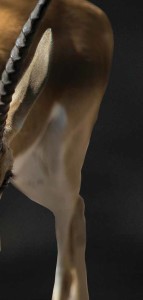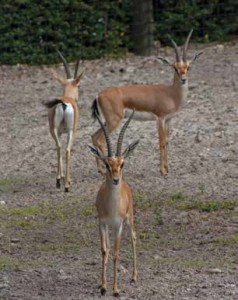For Endangered Species
It’s not as simple as boy meets girl
 Meeting that special someone can be a challenge for anyone. But what if you’re an endangered slender-horned gazelle? If you’re one of the approximately 250 left wandering the sand seas of northern Africa, you’ll need all your desert adaptations to find a suitable mate among the dunes. But if you’re in Naples, you’ve got a team of researchers, database engineers, geneticists, and zoologists to help insure your species survives to see another day.
Meeting that special someone can be a challenge for anyone. But what if you’re an endangered slender-horned gazelle? If you’re one of the approximately 250 left wandering the sand seas of northern Africa, you’ll need all your desert adaptations to find a suitable mate among the dunes. But if you’re in Naples, you’ve got a team of researchers, database engineers, geneticists, and zoologists to help insure your species survives to see another day.
COMPUTER DATING? BEEN DOING THAT FOR DECADES
It may kill a bit of the romance, but before a young gazelle’s fancy lightly turns to thoughts of love in the spring, a host of expert advisors weighs in. As Naples Zoo’s Director of Animal Programs Liz Harmon puts it, “The mountain of analysis from generations of breeding records balanced with conservation needs and institutional capacities can make Chinese algebra look easy.”
Because of the many zoos involved, the Association of Zoos and Aquariums (AZA) coordinates these efforts. AZA’s Wildlife Conservation and Management Committee manages over 500 cooperative Animal Programs, including Taxon Advisory Groups, Species Survival Plan® Programs, and Studbook Programs. With input from AZA Scientific Advisory Groups, Institutional Liaisons and Institutional Representatives, goals of cooperative animal management, conservation, and scientific initiatives are enacted. Suffice to say, it’s a far cry from “What’s your sign, baby?”
 MATCHING GLOBAL NEEDS AND LOCAL RESOURCES
MATCHING GLOBAL NEEDS AND LOCAL RESOURCES
Custom genetics software crunches numbers from databases populated with decades of records to help inform decisions. Once breeding recommendations are made, it’s up to wildlife professionals like Harmon across the country to integrate overall species needs with available local resources. After all institutions involved agree on the plan, it’s time to begin the logistics of safely moving rare and dangerous wildlife from one place to another. So yes, sometimes there really are snakes on a plane – or tigers in a truck.
A BREEDING PROGRAM WITH ALL MALES?
Finally, the animals arrive, clear quarantine, and Naples Zoo announces it’s new breeding program – with three male gazelles. “That’s the point where people usually look at you funny,” explains Harmon. As a way of explaining her three decades of wildlife experience do include basic biology, Harmon shares the bigger picture, “In the wild, one male gazelle typically has a harem of females while bachelor groups wait for their opportunity nearby. By working together, zoos are able to replicate that social order with some zoos having breeding herds while others care for the bachelor groups.” And when their genetics are needed to diversify the population, those bachelors get to walk down the aisle.
“That’s often a bittersweet time for keepers,” explains Naples Zoo’s President and CEO Jack Mulvena. “Keepers in accredited zoos get college degrees and are responsible for detailed daily records. They also do hard physical work in all weather and on weekends and holidays. And that’s all part of the big picture of wildlife conservation. So a breeding recommendation is exciting – but it can also mean saying goodbye to an animal you’ve spent years caring for.”
And even though they don’t share that same bond, volunteers and zoo guests often miss a beloved animal that moves away. But those are times that bring to focus what accredited zoos are doing and that these precious creatures are far from adored pets. In a world where wild areas vanish by the second and poachers still pull triggers, they are the assurance that our great grandchildren won’t just watch old video files about tigers and giraffes. And they are the inspiration for saving a world where a living lion’s roar can still make us catch our breath.
Far from the simple menageries of past, today’s nationally accredited zoos are centers of learning and natural crossroads for biologists, educators, environmental scientists, and researchers – as well as for students, conservationists, and all animal lovers. Naples Zoo at Caribbean Gardens is a trusted, private 501(c)(3) nonprofit serving wildlife and families here and around the world. More information at
www.napleszoo.org.

Leave a Reply
Want to join the discussion?Feel free to contribute!